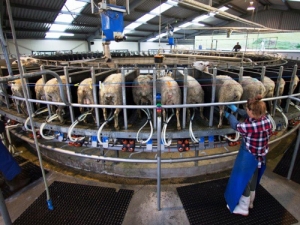Maui Milk achieves grass-fed certification in NZ
Sheep milk processor Maui Milk has achieved grass-fed certification of milk supply against the AsureQuality Grass-Fed Scheme.
 The pure East Friesian embryos, which have been frozen in time since the late 1990s, will be an essential part of a new genetic improvement programme.
The pure East Friesian embryos, which have been frozen in time since the late 1990s, will be an essential part of a new genetic improvement programme.
Rising interest in dairy sheep is about to be matched by the availability of milking ewes thanks to 15-year-old frozen embryos.
The pure East Friesian embryos, which have been frozen in time since the late 1990s, will be an essential part of a new genetic improvement programme. Dr Jock Allison, the original importer of the breed, retained the unique gene pool.
Maui Milk general manager Peter Gatley and Jake Chardon attended a dairy sheep conference at Massey in February this year and found themselves in conversation with Allison.
They were surprised to discover that 1700 East Friesian embryos still existed in their pure form, untouched in liquid nitrogen for more than 15 years. A deal was done on the spot, and within weeks, the entire stock was surgically implanted in recipient ewes at Awapai in Hawkes Bay, owned by Simon Beamish, one of the Rissington Breedline founding partners.
Impetus for the initiative has come from the creation of Maui Milk, a joint venture partnership between New Zealand farming and Chinese marketing interests.
Mated over maternal breeds such as Poll Dorset, Coopworth or Highlander, the result is known as an 'F1', or first cross, a hybrid with milking ability, constitution and hybrid vigour.
Similar ewes have formed the basis of the flock of 3000 milked by the Waituhi Kuratau Trust, the Maui Milk joint venture partner farming west of Lake Taupo.
The females resulting from the embryo programme will be milked in 2016, providing valuable data on the comparative performance of the pure strain under local conditions, and the top performers will be selected as embryo donors. Rams from various bloodlines will be retained for progeny testing, and the remainder will generate up to 10,000 crossbred milking ewes in their first year.
Allison is delighted to see the potential of the gene pool being realised. "I didn't want to see those embryos go out 50 or 100 at a time because this would dissipate the value. There's a critical mass of genetic material there that these guys can work with. I've no doubt they'll create something special".
This initiative will not only drive genetic gain, but also carry out farm system development to provide a template for Kiwi farmers to replicate. It is known as Southern Cross Dairy Sheep Technology.
Last month's Agritechnica event led to a wide group of manufacturers celebrating successes when the 2026 Tractor of the Year Competition winners, selected by a panel of European journalists, were announced in Hanover Germany.
According to the latest Federated Farmers banking survey, farmers are more satisfied with their bank and less under pressure, however, the sector is well short of confidence levels seen last decade.
Farmer confidence has taken a slight dip according to the final Rabobank rural confidence survey for the year.
Former Agriculture Minister and Otaki farmer Nathan Guy has been appointed New Zealand’s Special Agricultural Trade Envoy (SATE).
Alliance Group has commissioned a new heat pump system at its Mataura processing plant in Southland.
Fonterra has slashed another 50c off its milk price forecast as global milk flows shows no sign of easing.